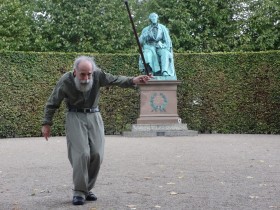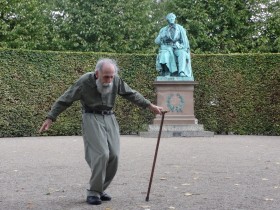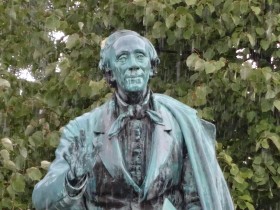Det er tirsdag i dag og Dokumaniadag på DR2, som i aften 20:45 sender den bemærkelsesværdige ”Kids for Cash” om en retssag i en lille by i Luzerne County i Pennsylvanias bjerge (atter en amerikansk provinsbyskildring som sidste tirsdags “Rich Hill”), en retssag, som i medierne fik dette mundrette navn, en retssag, som vakte betydelig opsigt.
Produceren Robert May (blandt andet af dokumentarfilmene ”The Fog of War” og ”Stevie”) boede i den by og var i gang med en spillefilm, da en utrolig historie begyndte at udfolde sig i byens virkelighed: en kendt og respekteret dommer blev anklaget og efter et langt sagsforløb dømt for at modtage penge fra to private ungdomsfængsler for de børn og helt unge, som han for ned til de mindst mulige forseelser idømte så lange straffe som muligt. Til afsoning i netop disse fængsler. ”Yes, Dickens could have made this up, but instead, the story was unfolding right before our eyes, in real life…”, fortæller May i en lang og dybt interessant produktionsbeskrivelse trykt i filmens Press Notes (link nedenfor). Undervejs blev børnene og deres forældre intimideret af såvel politiet som af dommeren og hans medarbejdere. De fik stort set aldrig en forsvarer, de blev narret og presset til at skrive under på, at de afstod. Men en mor gav ikke op, hun tog kampen på sig, og sagen begyndte at rulle, da den lokale radiostation og en journalist fra en avis tog fat. ”Each day, we would pick up the local and national papers and read about what was happening right where I live…”, fortæller May videre. ”The fiction film we’d been working on became less and less of our focus. Clearly, I and Lauren (Lauren Timmons, medproducer) had gotten hooked by the “Kids for Cash” scandal – not just as citizens, but as storytellers. We began to see it as a potential subject for a feature film; one that could capture an audience’s imagination just as it had captured our own…” Virkeligheden overgik fantasien i intensitet, spillefilm lagt til side, nu skulle der laves dokumentarfilm!
De arbejdede på filmen i fire år. Under omhyggelige sikkerhedsforanstaltninger interviewede de en lang række involverede og indsamlede arkivmateriale og afdækkede lidt efter lidt parallelt med medierne en ind i detaljerne forfærdende historie, og denne thriller skulle selvfølgelig blive filmens story line. Filmen blev bygget på interviews med en række involverede i dette arbejde, men især følger den i interviews fem af børnene og allervigtigst, viser det sig, dommeren Mark Ciavarella (foto), som efterhånden erobrer hele opmærksomheden, dramaet bliver hans…
Så vidt, så godt. Det hele er imidlertid omgivet af arkivmateriale: tv- og avisklip, private fotos og film og enkelte æstetiserende rekonstruktioner, som forventes at fortælle af sig selv. Og filmen er klippet som konventionen angiver for denne særlige slags dokumentarfilm, går det op for mig, når jeg følger Dokumanias repertoire og ser film, jeg ellers ikke ville komme i tanker om. For jeg kan jo egentlig ikke lide dem. Og slet ikke denne. Jo da, interviewene med børnene er vigtigt materiale, hver af disse en film i sig selv. Og de sensationelle interviews med dommeren kunne være kernen i en film med en kunstnerisk problemstilling, som jeg tænker mig, Errol Morris ville have valgt at lave, havde materialet været hans. Nu er det Robert Mays og han har villet noget andet. Han har, ser det ud til, først og fremmest villet påvirke samfundsinstitutionerne, villet fremtvinge ændringer i lovgivning og regler og procedurer. Og derfor har han villet have det hele med, ihvert fald så meget som muligt. Og det er gået ud over filmen, som er tænkt i sproglige udsagn (afsløringer og argumenter) og slet ikke i filmbilleder og -scener.
Filmen er derfor så mærkværdig grim at se på. Kameraarbejdet er ud over hvad, der helt nødvendigt skyldes optagebetingelserne under så forskellige vilkår over en årrække (igen må jeg anbefale at læse den inetressante produktionsbeskrivelse i pressematerialet), ikke på nogen måde prægnant. Den fotografiske behandling af arkivmaterialet er uden idé ud over illustration og bevis og bestemt ikke rig på variationer. Og så må der simpelthen have været mangel på billedmateriale, der er mange gentagelser af dækbilleder, og dækbilledbrugen virker tilfældig og den er uden idé.
Men researcharbejdet til filmens journalistiske indhold, graverarbejdet, er imponerende (og en sidste gang må jeg anbefale produktionsbeskrivelsen), og detaljerne i sandheden, som her kommer frem, er aldeles rystende. Og så er der studiet af dommeren Mark Ciavarella, som er en næsten shakespeare-lignende, uanede tanker vækkende skildring af et menneskesyn, et samfundssyn, et opdragelsessyn rummet i hans helt personlige udgave af zero tolerance. Denne pæne, kultiverede, veltalende mand, som nu er i fængsel på i realiteten livstid. Ude i den virkelige verden. Dette studie af et sådant menneske er alene filmen værd.
USA 2014, 105 min.
Press Notes: http://kidsforcashthemovie.com/wp-content/uploads/KIDS_FOR_CASH_Press_Notes_061914.pdf
New York Times: http://www.nytimes.com/2014/02/28/movies/kids-for-cash-directed-by-robert-may.html?_r=1
Variety: http://variety.com/2013/film/reviews/kids-for-cash-review-1200911791/
The Hollywood Reporter: http://www.hollywoodreporter.com/movie/kids-cash/review/657513






